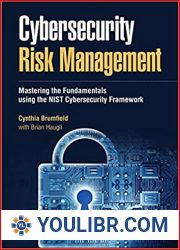
BOOKS - NETWORK TECHNOLOGIES - The Cybersecurity Dilemma Hacking, Trust and Fear Betw...

The Cybersecurity Dilemma Hacking, Trust and Fear Between Nations
Author: Ben Buchanan
Year: 2017
Format: PDF | EPUB
File size: 4,5 MB
Language: ENG
Year: 2017
Format: PDF | EPUB
File size: 4,5 MB
Language: ENG
Why do nations break into one another's most important computer networks? There is an obvious answer: to steal valuable information or to attack. But this isn't the full story. This book draws on often-overlooked documents leaked by Edward Snowden, real-world case studies of cyber operations, and policymaker perspectives to show that intruding into other countries' networks has enormous defensive value as well. Two nations, neither of which seeks to harm the other but neither of which trusts the other, will often find it prudent to launch intrusions. This general problem, in which a nation's means of securing itself threatens the security of others and risks escalating tension, is a bedrock concept in international relations and is called the 'security dilemma'.
ber güvenlik ikilemi: korsanlık, güven ve uluslar arasında korku Günümüz dünyasında teknoloji benzeri görülmemiş bir hızla gelişiyor ve İnternet günlük hayatımızın ayrılmaz bir parçası haline geldi. Bununla birlikte, teknolojinin hızlı büyümesiyle birlikte siber saldırılar, veri ihlalleri ve diğer siber saldırganlık biçimleri riski de ortaya çıkmaktadır. Ülkeler dijital sınırlarını güvence altına almaya çalışırken, kendilerini ağlarını güvence altına alma çabalarının diğer ülkeler tarafından düşmanca algılanabileceği güvencesiz bir konumda bulurlar. Bu fenomen, "güvenlik ikilemi'olarak bilinir; burada ulusal güvenliği sağlamak için yapılan eylemler, diğer uluslarda korku ve güvensizlik yaratabilir ve bu da daha fazla istikrarsızlık ve çatışmaya yol açabilir. 網絡安全困境:國家之間的黑客、信任和恐懼在當今世界,技術以前所未有的速度發展,互聯網已成為我們日常生活不可或缺的一部分。然而,隨著技術的快速增長,網絡攻擊、數據泄露和其他形式的網絡攻擊也出現了風險。隨著各國努力保護其數字邊界,它們往往發現自己處於危險境地,因為其他國家可能認為自己為確保網絡安全所做的努力是敵對的。這種現象被稱為「安全困境」,為確保國家安全而采取的行動可能會引起其他國家的恐懼和不信任,從而導致進一步的不穩定和沖突。
Dilema da segurança cibernética: invasão, confiança e medo entre as nações No mundo atual, a tecnologia evolui a uma velocidade sem precedentes, e a Internet tornou-se parte integrante do nosso dia a dia. No entanto, com o rápido crescimento da tecnologia, há também o risco de ataques cibernéticos, fuga de dados e outras formas de ciberagressão. Como os países procuram proteger as suas fronteiras digitais, muitas vezes estão em uma posição perigosa, em que os seus próprios esforços para garantir a segurança das suas redes podem ser considerados hostis por outros países. Este fenômeno é conhecido como um «dilema de segurança», quando as ações tomadas para garantir a segurança nacional podem causar medo e desconfiança em outras nações, o que levará a mais instabilidade e conflitos. 사이버 보안 딜레마: 국가 간 해킹, 신뢰 및 두려움 오늘날의 세계에서 기술은 전례없는 속도로 발전하고 있으며 인터넷은 일상 생활에서 없어서는 안될 부분이되었습니다. 그러나 기술이 빠르게 성장함에 따라 사이버 공격, 데이터 유출 및 기타 형태의 사이버 공격의 위험이 발생합니다. 국가가 디지털 국경을 확보하려고 할 때, 종종 네트워크를 확보하려는 자신의 노력이 다른 국가에 의해 적대적인 것으로 인식 될 수있는 위태로운 입장에 처하게됩니다. 이 현상은 국가 안보를 보장하기 위해 취한 조치가 다른 국가에서 두려움과 불신을 일으켜 불안정성과 갈등을 더욱 심화시킬 수있는 "안보 딜레마" 로 알려져 있습니다. معضلة الأمن السيبراني: القرصنة والثقة والخوف بين الدول في عالم اليوم، تتطور التكنولوجيا بمعدل غير مسبوق، وأصبحت الإنترنت جزءًا لا يتجزأ من حياتنا اليومية. ومع ذلك، مع النمو السريع للتكنولوجيا، يأتي أيضًا خطر الهجمات الإلكترونية وخروقات البيانات وأشكال أخرى من العدوان السيبراني. بينما تسعى البلدان إلى تأمين حدودها الرقمية، غالبًا ما تجد نفسها في وضع غير مستقر حيث قد تعتبر البلدان الأخرى جهودها الخاصة لتأمين شبكاتها عدائية. تُعرف هذه الظاهرة باسم «المعضلة الأمنية»، حيث يمكن للإجراءات المتخذة لضمان الأمن القومي أن تخلق الخوف وانعدام الثقة في الدول الأخرى، مما يؤدي إلى مزيد من عدم الاستقرار والصراع. Дилемма кибербезопасности: взлом, доверие и страх между нациями В современном мире технологии развиваются с беспрецедентной скоростью, и интернет стал неотъемлемой частью нашей повседневной жизни. Однако с быстрым ростом технологий также возникает риск кибератак, утечки данных и других форм киберагрессии. Поскольку страны стремятся защитить свои цифровые границы, они часто оказываются в опасном положении, когда их собственные усилия по обеспечению безопасности своих сетей могут восприниматься другими странами как враждебные. Это явление известно как «дилемма безопасности», когда действия, предпринятые для обеспечения национальной безопасности, могут вызвать страх и недоверие у других наций, что приведет к дальнейшей нестабильности и конфликтам. Das Dilemma der Cybersicherheit: Hacking, Vertrauen und Angst zwischen Nationen In der heutigen Welt entwickelt sich die Technologie mit beispielloser Geschwindigkeit und das Internet ist zu einem festen Bestandteil unseres täglichen bens geworden. Mit dem rasanten Wachstum der Technologie besteht jedoch auch die Gefahr von Cyberangriffen, Datenlecks und anderen Formen der Cyberaggression. Da Länder versuchen, ihre digitalen Grenzen zu schützen, befinden sie sich oft in einer gefährlichen tuation, in der ihre eigenen Bemühungen, ihre Netzwerke zu sichern, von anderen Ländern als feindlich empfunden werden können. Dieses Phänomen wird als „cherheitsdilemma“ bezeichnet, bei dem Maßnahmen zur Gewährleistung der nationalen cherheit bei anderen Nationen Angst und Misstrauen hervorrufen können, was zu weiterer Instabilität und Konflikten führen wird. The Cybersecurity Dilemma: Hacking, Trust, and Fear between Nations In today's world, technology is advancing at an unprecedented rate, and the internet has become an integral part of our daily lives. However, with the rapid growth of technology, there also comes the risk of cyber-attacks, data breaches, and other forms of cyber aggression. As nations strive to protect their digital borders, they often find themselves in a precarious situation where their own efforts to secure their networks can be perceived as hostile by other nations. This phenomenon is known as the "security dilemma," where the actions taken to ensure national security can create fear and mistrust among other nations, leading to further instability and conflict. サイバーセキュリティのジレンマ:ハッキング、信頼、恐怖今日の世界では、テクノロジーは前例のない速度で進化しており、インターネットは私たちの日常生活の不可欠な部分となっています。しかし、技術の急速な成長に伴い、サイバー攻撃、データ侵害、その他の形のサイバー攻撃のリスクも伴います。国々がデジタル国境を確保しようとすると、彼らはしばしば自分たちのネットワークを確保するための自分たちの努力が他国によって敵対的であると認識される不安定な立場にあることに気づく。この現象は「安全保障ジレンマ」として知られており、国家安全保障を確保するための行動が他国に恐怖と不信を生じさせ、さらに不安定性と紛争を引き起こす可能性がある。 Dylemat bezpieczeństwa cybernetycznego: hakowanie, zaufanie i strach między narodami W dzisiejszym świecie technologia ewoluuje w bezprecedensowym tempie, a Internet stał się integralną częścią naszego codziennego życia. Jednak wraz z gwałtownym rozwojem technologii pojawia się również ryzyko ataków cybernetycznych, naruszeń danych i innych form agresji cybernetycznej. Ponieważ kraje dążą do zabezpieczenia swoich granic cyfrowych, często znajdują się w niepewnej sytuacji, w której ich wysiłki na rzecz zabezpieczenia swoich sieci mogą być postrzegane przez inne kraje jako wrogie. Zjawisko to jest znane jako „dylemat bezpieczeństwa”, gdzie działania podjęte w celu zapewnienia bezpieczeństwa narodowego mogą wywołać strach i nieufność w innych krajach, prowadząc do dalszej niestabilności i konfliktu. télécharger le fichier pdf descargar archivo pdf PDF-Datei herunterladen PDFファイルをダウンロード تنزيل ملف pdf להוריד קובץ PDF download pdf file download pdf file pdf 파일 다운로드 скачать файл PDF 下载 pdf 文件 descarregar ficheiro pdf Scarica il file pdf pdf dosyasını indir pobierz plik pdf
Почему страны взламывают одни другие самые важные компьютерные сети Существует очевидный ответ, чтобы украсть ценную информацию или атаковать. Но это не полная история. Эта книга опирается на часто игнорируемые документы, просочившиеся Эдвардом Сноуденом, реальные тематические исследования киберопераций и перспективы политиков, чтобы показать, что вторжение в сети других стран также имеет огромную защитную ценность. Две страны, ни одна из которых не стремится причинить вред другой, но ни одна из которых не доверяет другой, часто считают разумным начинать вторжения. Эта общая проблема, в которой средства обеспечения безопасности наций угрожают безопасности других и рискуют обострить напряженность, является основополагающей концепцией в международных отношениях и называется дилеммой безопасности.
Why do nations break into one another's most important computer networks? There is an obvious answer: to steal valuable information or to attack. But this isn't the full story. This book draws on often-overlooked documents leaked by Edward Snowden, real-world case studies of cyber operations, and policymaker perspectives to show that intruding into other countries' networks has enormous defensive value as well. Two nations, neither of which seeks to harm the other but neither of which trusts the other, will often find it prudent to launch intrusions. This general problem, in which a nation's means of securing itself threatens the security of others and risks escalating tension, is a bedrock concept in international relations and is called the 'security dilemma'.
Pourquoi les pays entrent-ils dans les réseaux informatiques les plus importants les uns des autres ? Il y a une réponse évidente : voler des informations précieuses ou attaquer. Mais ce n'est pas une histoire complète. Ce livre s'appuie sur des documents souvent ignorés divulgués par Edward Snowden, des études de cas réelles de cyber-opérations et des perspectives politiques pour montrer que l'invasion des réseaux d'autres pays a également une grande valeur protectrice. Deux pays, dont aucun ne cherche à nuire à l'autre, mais dont aucun n'a confiance en l'autre, pensent souvent qu'il est raisonnable de lancer des incursions. Ce problème général, dans lequel les moyens nationaux de sécurité mettent en péril la sécurité des autres et menacent d'exacerber les tensions, est un concept fondamental dans les relations internationales et est appelé dilemme de la sécurité.
Perché i paesi entrano nelle reti informatiche più importanti? La risposta ovvia è rubare informazioni preziose o attaccare. Ma non è una storia completa. Questo libro si basa su documenti spesso ignorati, filtrati da Edward Snowden, studi di caso reali sulle cyberoperazioni e le prospettive dei politici per dimostrare che l'invasione delle reti di altri paesi ha anche un enorme valore protettivo. Due paesi, nessuno dei quali vuole fare del male all'altro, ma nessuno dei quali si fida dell'altro, spesso ritengono ragionevole avviare un'invasione. Questo problema generale, in cui gli strumenti nazionali di sicurezza mettono a repentaglio la sicurezza degli altri e minacciano un'escalation delle tensioni, è un concetto fondamentale nelle relazioni internazionali e si chiama dilemma della sicurezza.
Por que os países entram nas redes de computador mais importantes uns dos outros? A resposta óbvia é roubar informações valiosas ou atacar. Mas não é uma história completa. Este livro baseia-se em documentos frequentemente ignorados vazados por Edward Snowden, estudos de caso reais sobre ciberoperações e perspectivas de políticos para mostrar que a invasão de redes de outros países também tem um enorme valor protetor. Dois países, nenhum dos quais quer magoar o outro, mas nenhum dos quais confia no outro, muitas vezes consideram razoável iniciar uma invasão. Este problema geral, em que os meios nacionais de segurança comprometem a segurança dos outros e ameaçam a escalada das tensões, é um conceito fundamental nas relações internacionais e é chamado de dilema de segurança.
Warum passen Länder in die wichtigsten Computernetzwerke des jeweils anderen? Es gibt eine offensichtliche Antwort: wertvolle Informationen stehlen oder angreifen. Aber das ist keine vollständige Geschichte. Dieses Buch stützt sich auf oft ignorierte Dokumente, die von Edward Snowden durchgesickert sind, reale Fallstudien zu Cyber-Operationen und Perspektiven von Politikern, um zu zeigen, dass das Eindringen in die Netzwerke anderer Länder auch einen enormen Schutzwert hat. Zwei Länder, von denen keines versucht, dem anderen zu schaden, aber keines dem anderen vertraut, halten es oft für klug, Invasionen zu starten. Dieses allgemeine Problem, bei dem nationale Sicherheitsvorkehrungen die Sicherheit anderer gefährden und die Gefahr einer Eskalation der Spannungen darstellen, ist ein grundlegendes Konzept in den internationalen Beziehungen und wird als Sicherheitsdilemma bezeichnet.
¿Por qué los países se meten entre sí en las redes informáticas más importantes? Hay una respuesta obvia: robar información valiosa o atacar. Pero no es una historia completa. Este libro se basa en documentos a menudo ignorados filtrados por Edward Snowden, estudios de casos reales de ciberoperaciones y perspectivas de los políticos para demostrar que invadir las redes de otros países también tiene un enorme valor protector. Dos países, ninguno de los cuales busca dañar al otro, pero ninguno confía en el otro, suelen considerar razonable iniciar invasiones. Este problema general, en el que los medios de seguridad nacionales ponen en peligro la seguridad de otros y amenazan con aumentar las tensiones, es un concepto fundamental en las relaciones internacionales y se denomina dilema de seguridad.
Почему страны взламывают одни другие самые важные компьютерные сети Существует очевидный ответ, чтобы украсть ценную информацию или атаковать. Но это не полная история. Эта книга опирается на часто игнорируемые документы, просочившиеся Эдвардом Сноуденом, реальные тематические исследования киберопераций и перспективы политиков, чтобы показать, что вторжение в сети других стран также имеет огромную защитную ценность. Две страны, ни одна из которых не стремится причинить вред другой, но ни одна из которых не доверяет другой, часто считают разумным начинать вторжения. Эта общая проблема, в которой средства обеспечения безопасности наций угрожают безопасности других и рискуют обострить напряженность, является основополагающей концепцией в международных отношениях и называется дилеммой безопасности.
Why do nations break into one another's most important computer networks? There is an obvious answer: to steal valuable information or to attack. But this isn't the full story. This book draws on often-overlooked documents leaked by Edward Snowden, real-world case studies of cyber operations, and policymaker perspectives to show that intruding into other countries' networks has enormous defensive value as well. Two nations, neither of which seeks to harm the other but neither of which trusts the other, will often find it prudent to launch intrusions. This general problem, in which a nation's means of securing itself threatens the security of others and risks escalating tension, is a bedrock concept in international relations and is called the 'security dilemma'.
Pourquoi les pays entrent-ils dans les réseaux informatiques les plus importants les uns des autres ? Il y a une réponse évidente : voler des informations précieuses ou attaquer. Mais ce n'est pas une histoire complète. Ce livre s'appuie sur des documents souvent ignorés divulgués par Edward Snowden, des études de cas réelles de cyber-opérations et des perspectives politiques pour montrer que l'invasion des réseaux d'autres pays a également une grande valeur protectrice. Deux pays, dont aucun ne cherche à nuire à l'autre, mais dont aucun n'a confiance en l'autre, pensent souvent qu'il est raisonnable de lancer des incursions. Ce problème général, dans lequel les moyens nationaux de sécurité mettent en péril la sécurité des autres et menacent d'exacerber les tensions, est un concept fondamental dans les relations internationales et est appelé dilemme de la sécurité.
Perché i paesi entrano nelle reti informatiche più importanti? La risposta ovvia è rubare informazioni preziose o attaccare. Ma non è una storia completa. Questo libro si basa su documenti spesso ignorati, filtrati da Edward Snowden, studi di caso reali sulle cyberoperazioni e le prospettive dei politici per dimostrare che l'invasione delle reti di altri paesi ha anche un enorme valore protettivo. Due paesi, nessuno dei quali vuole fare del male all'altro, ma nessuno dei quali si fida dell'altro, spesso ritengono ragionevole avviare un'invasione. Questo problema generale, in cui gli strumenti nazionali di sicurezza mettono a repentaglio la sicurezza degli altri e minacciano un'escalation delle tensioni, è un concetto fondamentale nelle relazioni internazionali e si chiama dilemma della sicurezza.
Por que os países entram nas redes de computador mais importantes uns dos outros? A resposta óbvia é roubar informações valiosas ou atacar. Mas não é uma história completa. Este livro baseia-se em documentos frequentemente ignorados vazados por Edward Snowden, estudos de caso reais sobre ciberoperações e perspectivas de políticos para mostrar que a invasão de redes de outros países também tem um enorme valor protetor. Dois países, nenhum dos quais quer magoar o outro, mas nenhum dos quais confia no outro, muitas vezes consideram razoável iniciar uma invasão. Este problema geral, em que os meios nacionais de segurança comprometem a segurança dos outros e ameaçam a escalada das tensões, é um conceito fundamental nas relações internacionais e é chamado de dilema de segurança.
Warum passen Länder in die wichtigsten Computernetzwerke des jeweils anderen? Es gibt eine offensichtliche Antwort: wertvolle Informationen stehlen oder angreifen. Aber das ist keine vollständige Geschichte. Dieses Buch stützt sich auf oft ignorierte Dokumente, die von Edward Snowden durchgesickert sind, reale Fallstudien zu Cyber-Operationen und Perspektiven von Politikern, um zu zeigen, dass das Eindringen in die Netzwerke anderer Länder auch einen enormen Schutzwert hat. Zwei Länder, von denen keines versucht, dem anderen zu schaden, aber keines dem anderen vertraut, halten es oft für klug, Invasionen zu starten. Dieses allgemeine Problem, bei dem nationale Sicherheitsvorkehrungen die Sicherheit anderer gefährden und die Gefahr einer Eskalation der Spannungen darstellen, ist ein grundlegendes Konzept in den internationalen Beziehungen und wird als Sicherheitsdilemma bezeichnet.
¿Por qué los países se meten entre sí en las redes informáticas más importantes? Hay una respuesta obvia: robar información valiosa o atacar. Pero no es una historia completa. Este libro se basa en documentos a menudo ignorados filtrados por Edward Snowden, estudios de casos reales de ciberoperaciones y perspectivas de los políticos para demostrar que invadir las redes de otros países también tiene un enorme valor protector. Dos países, ninguno de los cuales busca dañar al otro, pero ninguno confía en el otro, suelen considerar razonable iniciar invasiones. Este problema general, en el que los medios de seguridad nacionales ponen en peligro la seguridad de otros y amenazan con aumentar las tensiones, es un concepto fundamental en las relaciones internacionales y se denomina dilema de seguridad.

















































